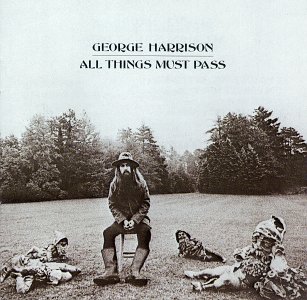- All Things Must Pass (song)
Infobox Song
Name = All Things Must Pass

Caption = Cover for the album (1970).
Type = Song
Artist =George Harrison
alt Artist =
Album =All Things Must Pass
Published = Harrisongs Ltd.
Released =November 27 1970
track_no = Side Three, Track 5
Recorded =
Genre =Rock music
Length = 3:47
Writer = George Harrison
Composer =
Label =Apple Records
Producer = George Harrison,Phil Spector
Chart position =
Tracks =
prev = "Awaiting On You All"
prev_no = Side Three, Track 4
next = "I Dig Love"
next_no = Side Four, Track 1
Misc = Extra tracklisting
altAlbum =Anthology 3
Type = Compilation
Length = 3:05
Label =EMI ,Apple Records
prev_track = "Oh! Darling "
prev_no = Disc Two, Track 9
this_track = "All Things Must Pass"
track_no = Disc Two, Track 10
next_track = "Mailman, Bring Me No More Blues"
next_no = Disc Two, Track 11"All Things Must Pass" is a song written by
George Harrison .During The
Beatles "Get Back" sessions in January 1969, this was one of many songs the group rehearsed to be part of their new album. As the sessions progressed, the song was pushed to the side. The rehearsal tapes were subsequently lost or stolen. (Those tapes resurfaced c.2006.) After the project was abandoned, Harrison recorded a solo demo of the song on multi-track tape onFebruary 25 ,1969 .) The song was never formally recorded by The Beatles by the time of their break-up, although considering the subject matter of the song, it would have been very suitable for their final release "Let It Be" in 1970.Harrison recorded the definitive version on his landmark "
All Things Must Pass " album later that year.The song underwent a number of small changes from when it was first written in late 1968. The line "a mind can blow those clouds away" was originally written as the more literal "a wind can blow those clouds away," but bootlegs from the January 1969 Beatles sessions reveal
John Lennon suggesting the change to "mind" to include a bit of "psychedelia " in the song. Perspective on one line was slightly changed from "It's not always been this grey" (with The Beatles) on the demo to "It's not always gonna be this grey" (on his own) on the final recording.Billy Preston , who played keyboard during "Get Back/Let It Be" sessions and later performed with The Beatles at the Roof Concert, recorded his version of the song on "Encouraging Words " album (as well as he recordedMy Sweet Lord )- before it surfaced on Harrison's triple album.The title and lyrics of the song probably come from the last words of Buddah:"All composite things pass away. Strive for your own liberation with diligence"(often shortened to "All things must pass away".)
Paul McCartney sang this song at the "Concert for George " memorial for Harrison onNovember 29 ,2002 .
Wikimedia Foundation. 2010.
